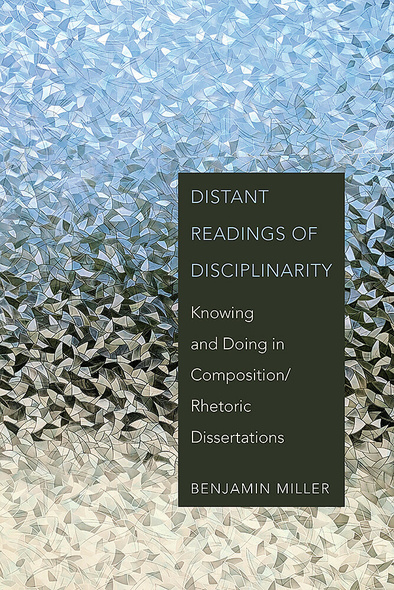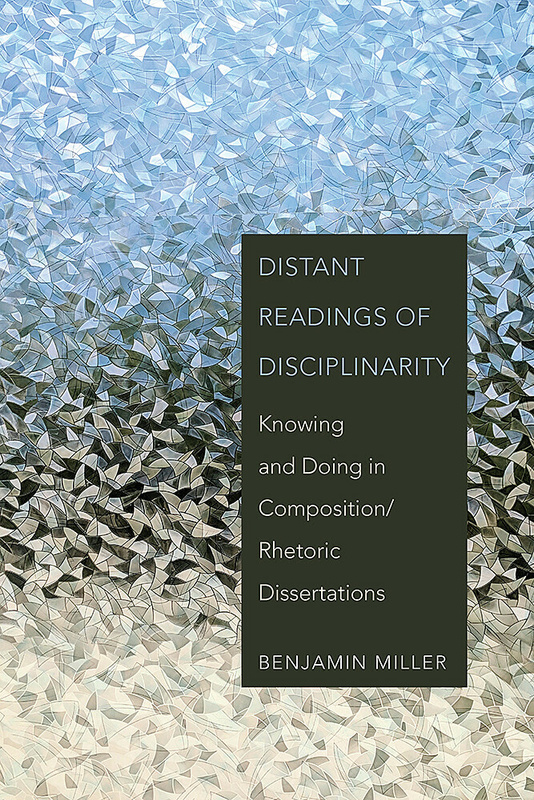Our shopping cart is currently down. To place an order, please contact our distributor, UTP Distribution, directly at utpbooks@utpress.utoronto.ca.
Distant Readings of Disciplinarity
Knowing and Doing in Composition/Rhetoric Dissertations
Utah State University Press
In Distant Readings of Disciplinarity, Benjamin Miller brings a big data approach to the study of disciplinarity in rhetoric, composition, and writing studies (RCWS) by developing scalable maps of the methods and topics of several thousand RCWS dissertations from 2001 to 2015. Combining charts and figures with engaging and even playful prose, Miller offers an accessible model of how large-scale data-driven research can advance disciplinary understanding—both answering and amplifying the call to add replicable data analysis and visualization to the mix of methods regularly employed in the field.
Writing studies has long been marked by a multitude of methods and interlocking purposes, partaking of not just humanities approaches but also social scientific ones, with data drawn from interviews and surveys alongside historical and philosophical arguments and with corpus analytics in large-scale collections jostling against small-scale case studies of individuals. These areas of study aren’t always cleanly separable; shifting modes mark the discipline as open and welcoming to many different angles of research. The field needs to embrace that vantage point and generate new degrees of familiarity with methods beyond those of any individual scholar.
Not only a training genre and not only a knowledge-making genre, the dissertation is also a discipline-producing genre. Illustrating what the field has been studying, and how, Distant Readings of Disciplinarity supports more fruitful collaborations within and across research areas and methods.
Writing studies has long been marked by a multitude of methods and interlocking purposes, partaking of not just humanities approaches but also social scientific ones, with data drawn from interviews and surveys alongside historical and philosophical arguments and with corpus analytics in large-scale collections jostling against small-scale case studies of individuals. These areas of study aren’t always cleanly separable; shifting modes mark the discipline as open and welcoming to many different angles of research. The field needs to embrace that vantage point and generate new degrees of familiarity with methods beyond those of any individual scholar.
Not only a training genre and not only a knowledge-making genre, the dissertation is also a discipline-producing genre. Illustrating what the field has been studying, and how, Distant Readings of Disciplinarity supports more fruitful collaborations within and across research areas and methods.
‘This book is a gem. Miller not only has done a beautiful job of analyzing a large and difficult data set to answer a very thorny set of questions but also does so with accessible language and inviting prose.’
—Elizabeth Wardle, Miami University
‘Packed with smart, careful, one-of-a-kind research; its impact is sure to be broad and enduring for the betterment of all who associate their work with rhetoric and composition/writing studies.’
—Derek N. Mueller, Virginia Tech
Benjamin Miller is assistant professor of composition in the English Department at the University of Pittsburgh, and he focuses on digital research and pedagogy. He is coeditor of Composition and Big Data and cofounder of the Journal of Interactive Technology and Pedagogy and the Writing Studies Tree, an online crowd-sourced database of academic genealogies within writing studies.





